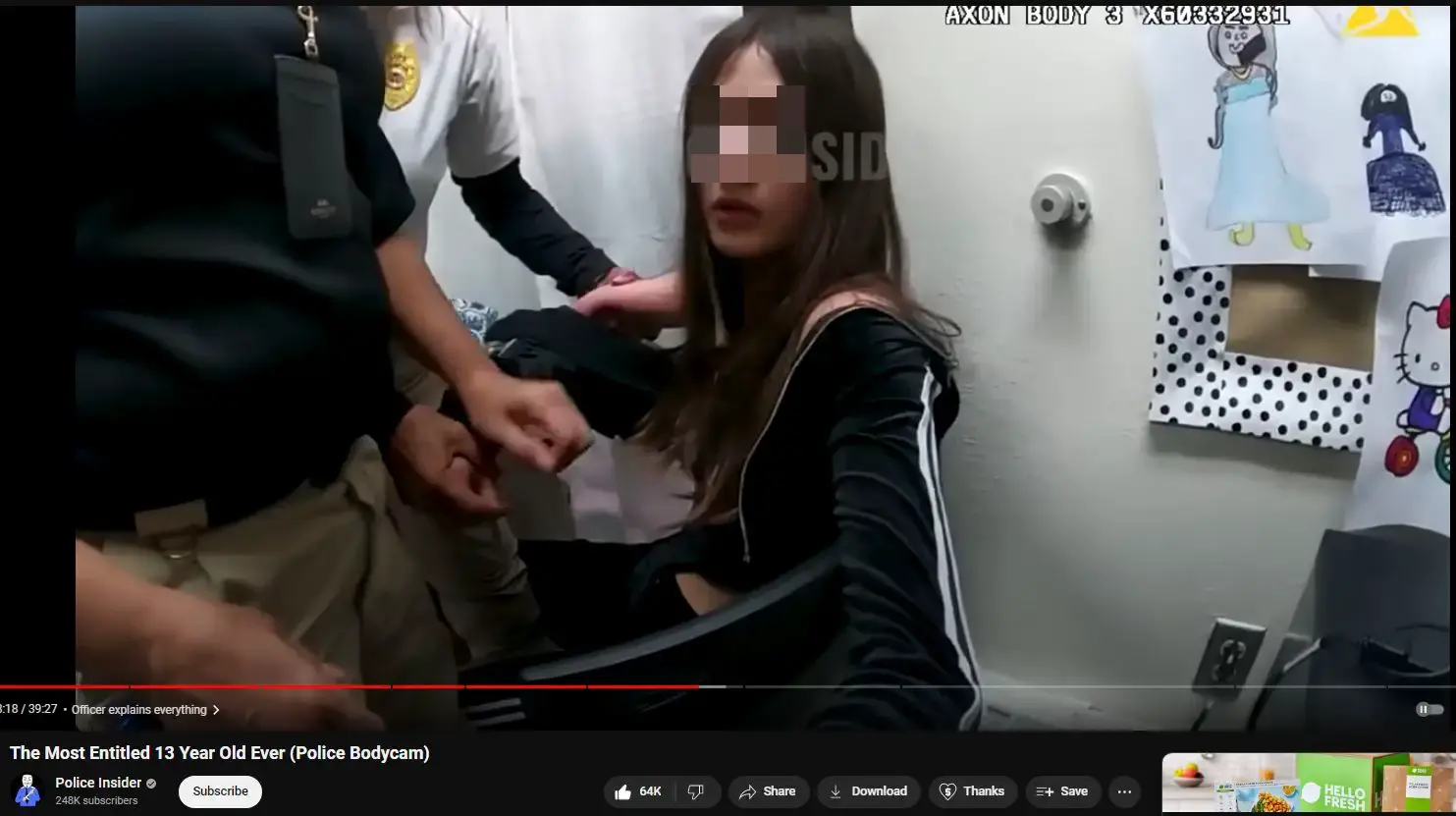Most Entitled 13 Year Old Ever
We’ve all seen growing badness. This seems particularly egregious. “Entitled” doesn’t really seem to cover it. Not sure there is a word for it but instead maybe a phrase describing utter disconnect between attitude and behavior versus perception and consequence. The programming for such viewpoint and behavior is surely coming via media and music which exhorts, ‘do what thou will’ ? Of all intelligible ‘words’ spoken by the minor, more than 50% are curse; many are slang, many sound slurred into something resembling whiney-yappy drivel — possibly worth a quick listen to become familiar as what spills from the mouth overflows from the heart sometimes filtered by the mind. Overall this situation and its ominous extrapolation is a tarbaby conundrum; even Lennon Honor would be confounded. Over 56,000 comments to the video which was posted 7 days ago on 23 Dec 2023 — already a minor celebrity as posterchild for angst, self-disrespect and derailment!
https://www.youtube.com/watch?v=_q5i75mAkRk
See also https://soundquality.org/2024/03/the-most-entitled-16-year-old-girl-ever-police-bodycam/
There is pattern here — the wild, googly eyes, the combative affrontiveness — See Also WHEN THE MOST ENTITLED 16 YEAR OLDS GET ARRESTED — https://www.youtube.com/watch?v=7GMjALgLudE
A teenager’s sense of entitlement can sometimes be a point of concern for parents, educators, and society at large. This sense of entitlement can manifest as an expectation to receive certain privileges or treatment without earning them or showing gratitude. Here are some factors that might contribute to a sense of entitlement in teenagers and ways to address it:
Contributing Factors
1. Social Media and Comparison: Constant exposure to curated lifestyles on social media can lead teenagers to expect similar experiences, possessions, or treatment, believing these are the norm rather than exceptions.
2. Parenting Styles: Overprotective or indulgent parenting, where parents rush to remove obstacles from their child’s path or provide unearned rewards, can foster entitlement.
3. Cultural Influences: A culture that emphasizes material success and personal fulfillment without equally stressing effort, community responsibility, or gratitude can contribute to entitlement.
4. Peer Influence: Teenagers are highly influenced by their peers. Being in a group that promotes or exhibits entitled behavior can reinforce similar attitudes in individuals.
5. Lack of Responsibility: Not having chores, obligations, or expectations can lead to a lack of appreciation for effort and achievement, fostering a belief that things should come easily.

Addressing Entitlement
1. Teach Gratitude: Encourage practices that foster gratitude, such as keeping a gratitude journal or regularly discussing things to be thankful for.
2. Set Clear Expectations: Clearly communicate what is expected in terms of behavior, contributions to household chores, and academic or extracurricular engagement.
3. Encourage Empathy: Activities that encourage empathy, like volunteering or being in diverse social groups, can help teenagers appreciate what they have and understand others’ perspectives.
4. Promote Responsibility: Assign responsibilities and chores. Contributing to the family or community helps teenagers understand the value of work and the satisfaction of earning.
5. Model Behavior: Adults should model the behavior they wish to see. Showing gratitude, working hard, and expressing appreciation for what you have can set a powerful example.
6. Limit Overindulgence: While it’s natural to want to give children what they desire, it’s important to strike a balance. Teach the value of earning privileges, money, or material goods through chores, good behavior, or academic achievement.
7. Foster Independence: Encourage teenagers to take on tasks independently, make decisions within set boundaries, and understand the consequences of their actions.
Entitlement is not an irreversible trait. With conscious effort from caregivers and a supportive environment, teenagers can develop a healthier, more balanced perspective on privileges and responsibilities.
From the video description (with addition from comments) —
Note for privacy reviewer:
No individual in the video is uniquely identifiable by a combination of image, voice, full name, government identification number, bank account number, contact information (e.g. home address, email address) or other uniquely identifiable information
Additionally, this video is posted in public interest and is newsworthy.
Furthermore, the video and the information is otherwise publicly available on the Las Cruces Police Department website.
Comments from the video —
“I could barely understand a word this kid said, how do we have people her age speaking so poorly? After watching this I texted my mother at 1 am just to thank her for all she’s done to raise me right, and that I love her. Anyone watching should do the same to your mom, dad, uncle, aunt, coach, mentor, scout leader, etc. Kids are a direct reflection of their environments, this is proof.”
—
“She’s going to burn out early if she doesn’t get her life together. To be like this at 13 is insane”
—
“Even the “bad” kids in my generation never spoke to elders like these two did.”
—
“In defense of the mother’s phone call at around 37:30 — she was probably basing her response upon her daughter’s recollection, and neither had yet seen the video footage. One would think the daughter’s soul would be (or would become) embarassed by her behavior. The sudden onset of the officer at the takedown…it is what it is; everyone has a pivot point, and to be so wantonly disrespected, it’s a kind of being spat-upon.”
—
“I know she’s just a kid, but this kind of behavior is just going to get worse if it’s not corrected now because she just thinks she could say and do whatever she wants without any consequences”
—
“Feral is a word apropos.”
Corollary video suggested by YouTube provides an Excellent walk-thru of the process of discovering and arresting a DUI — https://www.youtube.com/watch?v=sOtPcyOlslM
Surprising and shameful is the amount of time spent during this outlandish episode worrying about, arguing over, focusing on the girl’s cellphone.